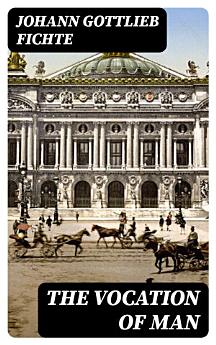The Vocation of Man
Johann Gottlieb Fichte
nov 2022 · DigiCat
Libro electrónico
129
Páginas
family_home
Apto
info
reportLas calificaciones y opiniones no están verificadas. Más información
Acerca de este libro electrónico
In "The Vocation of Man," Johann Gottlieb Fichte presents a profound exploration of human purpose and self-realization, articulated through a series of philosophical discourses. Employing a clear yet passionate prose style, Fichte engages with Enlightenment ideals while also carving a distinctive path through German Idealism. The book is structured as a dialogue between a teacher and a student, enabling the nuanced interplay of thought that encourages readers to confront their own existential inquiries. Within the context of early 19th-century philosophy, Fichte's work addresses the pivotal themes of individual freedom, ethical responsibility, and the interplay between the self and the absolute. Fichte, a central figure in German philosophy, evolved from the influence of Kant, seeking to articulate a system that emphasizes the role of the self in the creation of meaning. His own experiences—his education and reflection upon the nature of consciousness—were instrumental in shaping his ideas. Fichte's understanding of human vocation was deeply rooted in the socio-political currents of his time, which challenged individuals to pursue moral and intellectual autonomy amid the turbulent backdrop of the Napoleonic Wars. This book is highly recommended for readers interested in philosophy, ethics, and the human condition. Fichte's philosophical vision prompts an enlightening examination of our own vocations and the responsibilities that accompany them. "The Vocation of Man" is not only a significant philosophical text but also an invitation to engage deeply with one's purpose in a complex world.
Acerca del autor
Johann Gottlieb Fichte (1762–1814) was a German philosopher who made significant contributions to the development of German Idealism, an intellectual movement that sought to realize the ideals of self-consciousness and freedom. He is one of the key figures associated with this movement, along with his contemporaries and successors such as Kant, Schelling, and Hegel. Fichte's philosophy is characterized by his radical approach to the role of the self in the construction of reality, which he explored in his major works, including 'The Vocation of Man' (Die Bestimmung des Menschen, 1800). In it, Fichte outlined his ethical philosophy, which centers on the idea that individuals are called upon to create their essence through free action, a concept that foreshadows existentialist thought. Fichte's work emphasized the importance of self-awareness and the active role of the individual in shaping both their destiny and the moral order of the world. His thought influenced not only philosophy but also the spirit of nationalism in Germany. Fichte was a prolific writer and a notable public intellectual of his time. Despite the dense and sometimes opaque nature of his writing, Fichte's ideas have endured and continue to inspire scholars of philosophy, particularly those interested in the nature of self-consciousness and the foundations of human freedom.
Califica este libro electrónico
Cuéntanos lo que piensas.
Información de lectura
Smartphones y tablets
Instala la app de Google Play Libros para Android y iPad/iPhone. Como se sincroniza de manera automática con tu cuenta, te permite leer en línea o sin conexión en cualquier lugar.
Laptops y computadoras
Para escuchar audiolibros adquiridos en Google Play, usa el navegador web de tu computadora.
Lectores electrónicos y otros dispositivos
Para leer en dispositivos de tinta electrónica, como los lectores de libros electrónicos Kobo, deberás descargar un archivo y transferirlo a tu dispositivo. Sigue las instrucciones detalladas que aparecen en el Centro de ayuda para transferir los archivos a lectores de libros electrónicos compatibles.







